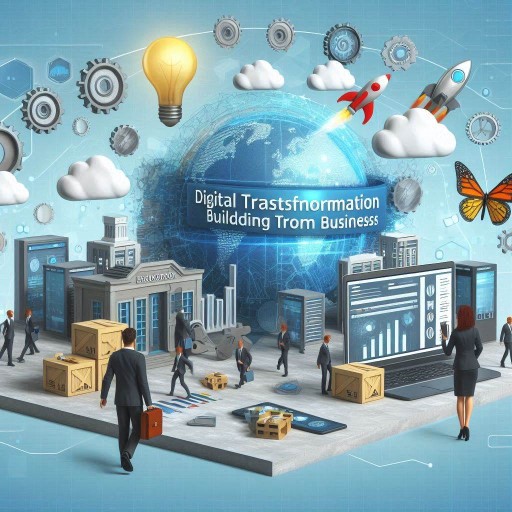TechTrend4u – In the ever-evolving digital age, digital transformation has become an urgent necessity for businesses of all sizes. This transformation involves the adoption of digital technologies to optimize processes, improve efficiency, and create new value. This article will discuss various aspects of digital transformation, including cloud computing, big data analytics, business process automation, e-commerce, MSME digitization, cybersecurity, and digital culture.

Cloud Computing: The Cloud that Supports Your Business
What is Cloud Computing?
Cloud computing is a technology that enables the storage and access of data and applications over the internet, rather than through local servers or personal computers. This gives businesses the flexibility to access resources anytime and from anywhere.
Benefits of Cloud Computing
- Scalability: Businesses can easily scale up or down storage capacity as needed without having to invest in physical infrastructure.
- Cost Efficiency: Reduced initial investment and hardware maintenance costs.
- Better Collaboration: Teams can work simultaneously from multiple locations, improving productivity and collaboration.
Implementation Example
Companies like Netflix use cloud computing to store and manage their millions of customer data and deliver streaming content around the world. By utilizing cloud services, Netflix can offer a fast and reliable experience for its users.
Read more: Cloud Computing: The Cloud that Supports Your Business
Big Data Analytics: Making Better Decisions
What is Big Data?
Big data refers to a huge volume of data, both structured and unstructured, that can be analyzed to find patterns, trends, and associations. With big data analytics, businesses can make decisions based on insights gained from large and complex data.
Benefits of Big Data Analytics
- More Informed Decision Making: Data provides deeper insights into consumer behavior, allowing businesses to make more accurate decisions.
- Personalization: Data analytics allows businesses to offer a more personalized experience to customers, increasing satisfaction and loyalty.
- Operational Optimization: Identify inefficiencies and improve business processes more effectively.
Implementation Example
Amazon uses big data analytics to personalize product recommendations to customers, which increases sales and customer satisfaction. This recommendation system is based on data analysis of previous customer shopping behavior.
Read more: Big Data Analytics: Making Better Decisions
Business Process Automation: Increase Efficiency
What is Business Process Automation?
Business process automation involves using technology to perform routine tasks automatically, reducing the need for human intervention. This includes everything from workflow automation, data processing, to customer relationship management.
Benefits of Automation
- Time Efficiency: Reduces the time needed to complete repetitive tasks.
- Reduced Errors: Automated processes tend to be more consistent and free from human error.
- Increased Productivity: Employees can focus on strategic tasks, increasing overall productivity.
Implementation Example
Logistics companies like DHL use automation to manage their supply chain and package delivery. With automation systems, DHL can track shipments in real-time, optimize routes, and reduce delivery times.
E-commerce and Digital Marketing: Success in the Online World
Opportunities and Challenges E-commerce
E-commerce, or electronic commerce, refers to the buying and selling of products or services over the internet. It opens up huge opportunities for businesses to reach a wider market without geographical boundaries.
Digital Marketing: Increasing Online Visibility
Digital marketing encompasses all marketing efforts that use electronic devices or the internet. This includes SEO, social media marketing, email marketing, and online advertising.
Benefits of E-commerce and Digital Marketing
- Access to Global Markets: Businesses can sell products to customers around the world without having to have a physical store.
- Better Measurement: Digital marketing allows real-time tracking and measurement of campaign performance.
- More Efficient Costs: Compared to traditional marketing, digital marketing is often more cost-effective.
Implementation Example
E-commerce sites like Tokopedia and Bukalapak have enabled thousands of MSMEs in Indonesia to sell their products online, reach customers across the country, and even in international markets.
Read more: E-commerce and Digital Marketing: Success in the Online World
MSME Digitalization: Taking Small Businesses Global
The Importance of Digitalization for MSMEs
Digitalization enables Micro, Small, and Medium Enterprises (MSMEs) to improve efficiency, expand markets, and compete on a global level. With digitalization, MSMEs can strengthen their brand and expand their business reach.
Benefits of Digitalization for MSMEs
- Wider Market Access: Digitalization allows MSMEs to sell their products not only in the local market, but also in the international market.
- More Efficient Management: Digital technologies such as accounting and stock management software help MSMEs manage their business operations more efficiently.
- Increased Competitiveness: With digitalization, MSMEs can compete with larger companies in terms of customer service, marketing, and user experience.
Implementation Example
MSMEs in Indonesia that utilize digital platforms such as Shopee and Lazada have successfully increased their sales and expanded their customer base, even to overseas markets.
Read more: MSME Digitalization: Taking Small Businesses Global
Cyber Security in Digital Transformation: Protect Your Business
Rising Cyber Threats
Along with the increase in digitalization, cybersecurity threats are also increasing. Businesses must be aware of various threats such as malware, phishing, and ransomware attacks that can damage business data and operations.
Cybersecurity Strategy
- Education and Training: Educating employees on good security practices is essential to prevent cyberattacks.
- Data Protection: Using encryption and firewalls to protect sensitive data.
- Monitoring and Rapid Response: Implement a monitoring system that can detect and respond to threats quickly.
Implementation Example
Major banks around the world, such as Bank of America, have invested billions of dollars in cybersecurity to protect customer data and ensure that online transactions are safe from cyber threats.
Read more: Cyber Security in Digital Transformation: Protect Your Business
Digital Culture: The Key to Successful Digital Transformation
What is Digital Culture?
Digital culture refers to a way of thinking and acting that encourages the effective use of digital technology in organizations. It involves the adoption of technology by all members of the organization and the use of data in decision-making.
Building a Digital Culture
- Supportive Leadership: Leadership that encourages innovation and experimentation with digital technologies.
- Employee Engagement: Engaging employees in the digital transformation process through training and open communication.
- Continuous Innovation: Drive innovation by continuously adopting new technologies and adjusting business strategies according to market changes.
Implementation Example
Google is known for its culture that encourages digital innovation. The company gives employees the freedom to experiment with new technologies, which ultimately results in innovative products like Google Maps and Android.
Read more: Digital Culture: The Key to Successful Digital Transformation
Conclusion
Digital transformation is an unavoidable journey for businesses that want to stay relevant and competitive in the modern era. With the adoption of technologies such as cloud computing, big data analytics, and automation, businesses can improve efficiency and optimize operational processes. Digitalization also opens up great opportunities for MSMEs to compete in the global market. However, with all these benefits, it is important to always consider cybersecurity aspects and build a supportive digital culture. With the right strategy, digital transformation can be the key to long-term success for businesses across industries.



